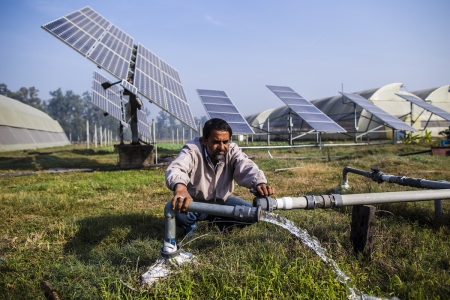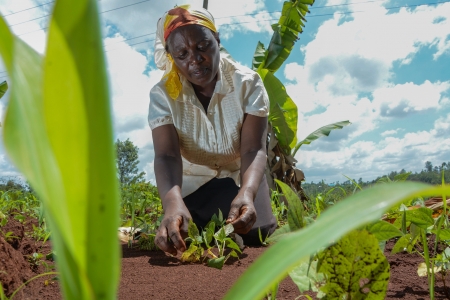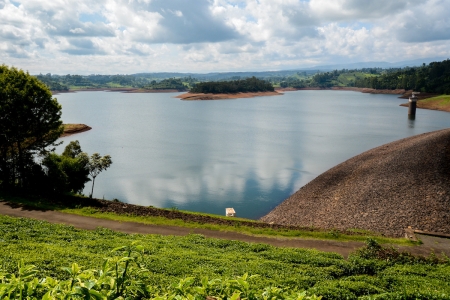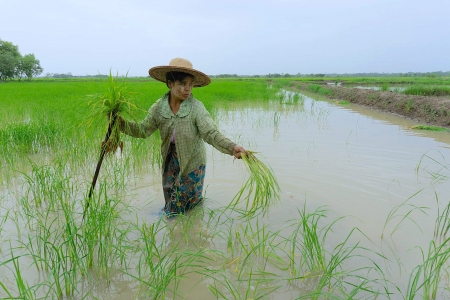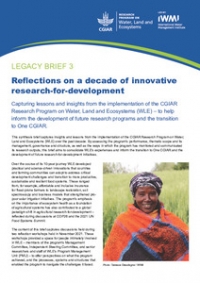Originally published by CoSAI
Colombo, August 20, 2021
With the world's population set to grow beyond 9 billion by 2050, and with climate change making it harder to grow food in many areas, the Global South must find ways to increase food production while limiting or reversing its environmental impact. Despite this, only an estimated 7% of current innovation spending in agriculture explicitly targets environmental outcomes, according to a new innovation investment study from the Commission on Sustainable Agriculture Intensification (CoSAI).
The evidence follows CoSAI's investment gap study, published August 13, which found that investing an additional USD 15.2 billion in sustainable agricultural innovation each year – a fraction of the estimated USD 700 billion that governments already spend annually to subsidize farming – could significantly lower agriculture's greenhouse gas emissions, water use, and pollution as well as dramatically reduce global hunger.
By reviewing recent public and private investment in agricultural innovation for the Global South, the new innovation investment study shows where current spending is coming from, who is using it, and how. Crucially, the study reveals that not enough of this investment is promoting the multiple economic, environmental, and social objectives of sustainable agricultural intensification.
Dr. P.V. Vara Prasad, CoSAI Commissioner, University Distinguished Professor and Director of the Feed the Future Innovation Lab for Collaborative Research on Sustainable Intensification at Kansas State University, USA, writes: "The investment balance must change if we are to successfully tackle the key global challenges of food security, malnutrition and climate action as well as address the Sustainable Development Goals (SDGs) by 2030. In a world that is rapidly undergoing climate change, investments in innovation that fail to take environmental impacts into consideration will not change the trajectory of agriculture rapidly enough to meet sustainability and climate targets."
Among the findings of the innovation investment study:
- Only about 4.5% of the Global South's total agricultural output – approximately USD 60 billion a year – is spent on agricultural innovation.
- Of the estimated 7% of innovation spending explicitly targeting environmental outcomes, only around half also includes social or human objectives. Most innovation spending is focused on improving productivity and economic outcomes.
- National governments of the Global South are the largest investor, contributing around 60–70% of total spending on agricultural innovations. China's investment accounts for about half of the total investment from national governments.
- The private sector invests around USD 13 billion annually on agricultural innovation for the Global South (20–25% of the global total) with about half spent on developing crop inputs like seeds, pesticides, and farm machinery.
The study suggests several ways in which the innovation investment portfolio can be rebalanced. In some cases, new investments need to be made that target sustainable agricultural innovation. In others, existing innovation funding can be re-orientated to focus on environmental and social goals and outcomes, in addition to productivity.Improved reporting of agricultural funding could also encourage a shift in investment toward sustainable innovation, and CoSAI has launched an international Taskforce on Principles and Metrics for Innovation to increase reporting standards and transparency.
Funding by development partners – such as aid donors, international investment banks and philanthropic organizations – is also likely to play an important role. Although these organizations only contribute about 10–20% of total innovation spending, their investments frequently align with government funding to catalyze considerable impacts in agricultural innovation, often supporting transformational research considered too risky by governments and private investors.
Together, the findings and conclusions of this report show how national governments, private investors and development partners can make the necessary investments in agriculture to reduce global hunger, improve nutrition, mitigate climate change and sustainably manage the Earth's water resources.
The report, Funding Agricultural Innovation for the Global South: Does it Promote Sustainable Agricultural Intensification?, was published by CoSAI on August 20, 2021.
Notes to Editors
Commission on Sustainable Agriculture Intensification (CoSAI)
The Commission on Sustainable Agriculture Intensification (CoSAI) brings together 21 Commissioners to influence public and private support to innovation in order to rapidly scale up sustainable agricultural intensification (SAI) in the Global South. For CoSAI, innovation means the development and uptake of new ways of doing things – in policy, social institutions and finance, as well as in science and technology. CoSAI was initiated and is supported by the CGIAR Research Program on Water, Land and Ecosystems (WLE), funded by the CGIAR Trust Fund and other donors. CoSAI Commissioners are independent. CoSAI is facilitated by a Secretariat based at the International Water Management Institute (IWMI) headquarters in Colombo, Sri Lanka.
Dalberg Advisors
Dalberg Advisors were commissioned to complete the study. Dalberg Advisors are a strategic advisory firm within Dalberg that works collaboratively across public, private and philanthropic sectors to fuel inclusive growth. Established in 2001, Dalberg currently employs more than 450 employees working in 29 worldwide locations. It has worked with clients in more than 90 countries.
For more information, please contact wle-cosaisecretariat@cgiar.org

/index.jpg?itok=EzuBHOXY&c=feafd7f5ab7d60c363652d23929d0aee)


